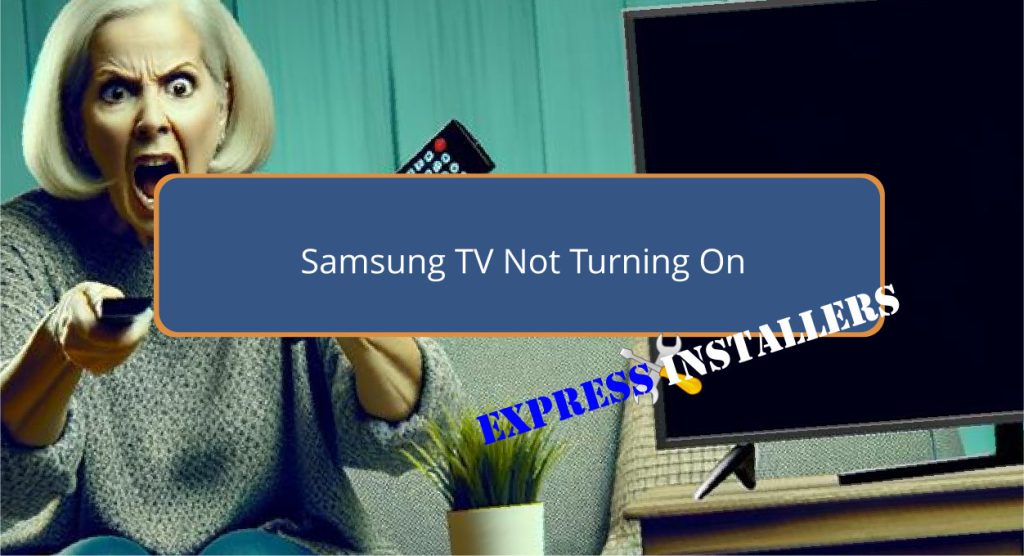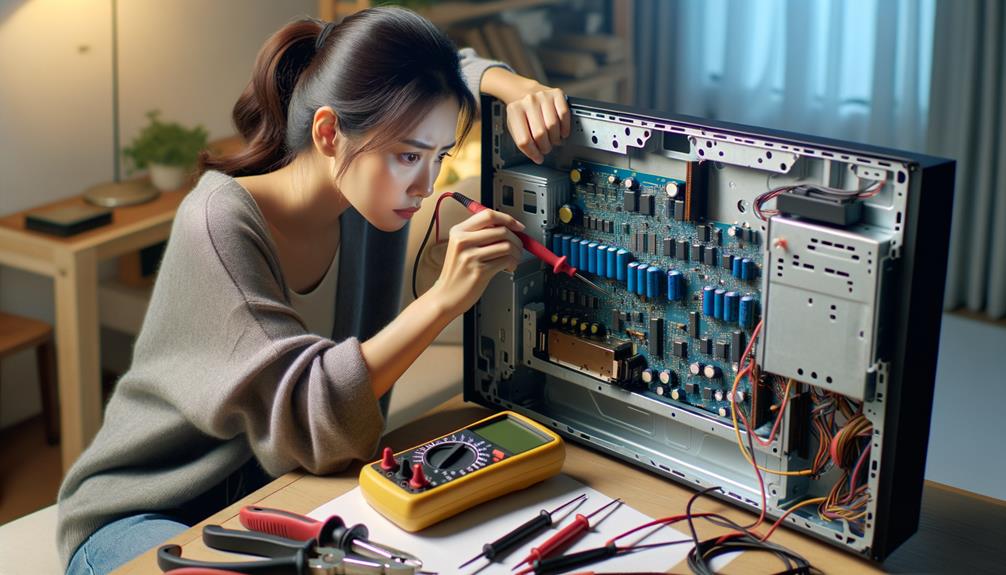
If your Samsung TV is not turning on, start by checking the red standby light, making sure it is illuminated, indicating power availability.
Next, verify the functionality of both the remote control and the TV’s physical power button.
Examine power connections for any loose or damaged wires, and confirm the TV is set to the correct input source.
Consider resetting the power by unplugging the TV, waiting a minute, and reconnecting it. This can help resolve minor power-related glitches.
Further inspection and diagnostics might help identify underlying issues for more complex situations.
Gaining deeper insights into each step can help bring your TV back to life.
Quick Summary
- Check if the red standby light is on, indicating the TV is receiving power.
- Test both the TV’s power button and the remote control to rule out control issues.
- Reset the power supply by unplugging the TV, waiting a minute, and plugging it back in.
- Inspect capacitors on the power board for any signs of damage like bulging or leaking.
- Ensure the TV firmware is up-to-date to avoid software-related power issues.
Initial Troubleshooting Steps
When encountering power issues with your Samsung TV, initiating a systematic troubleshooting approach can swiftly identify the root cause and provide potential solutions.
Begin by confirming the status of the red standby light. If it is on, test the functionality of your remote control and the TV’s power button to check for responsiveness.
This step helps isolate whether the issue lies within the remote’s batteries or the power button itself.
Additionally, verify the integrity of HDMI cable connections and make sure that the correct input source is selected.
These actions are important as loose or improper HDMI connections, and incorrect input source settings can prevent your TV from displaying any images even if powered on.
Checking Power Supply Issues
To address power supply issues in your Samsung TV, first disconnect the power cord and press the TV’s power button for 10 seconds to reset its power system.
This step helps to clear any residual power that might be affecting the television’s functionality.
After reconnecting the power cord, observe if the TV shows any signs of life, such as standby lights or start-up sounds.
It’s also important to take into account external factors like voltage fluctuations which can impact the performance of your TV. Using a surge protector can help mitigate these risks.
Additionally, verify the TV’s model number to make sure any further troubleshooting steps are specifically tailored to your model, enhancing the effectiveness of your efforts in resolving power supply issues.
Inspecting TV Capacitors

After addressing potential power supply issues, it is important to examine the TV’s capacitors for any signs of damage, such as leaking or swelling, which are common indicators of malfunction.
Capacitors are critical for storing and releasing electrical energy, and their failure can lead to significant power disruptions, including a TV that won’t turn on.
When inspecting, look for bulging or ruptured capacitors on the power board, a definitive sign that capacitor replacement is necessary.
Following a detailed troubleshooting guide, isolate the faulty capacitors for precise intervention.
Regular inspection and timely replacement of damaged capacitors are essential in maintaining the functionality and extending the lifespan of your Samsung TV.
This proactive approach can prevent more complex power-related issues.
Advanced Diagnostic Techniques
Employing advanced diagnostic techniques can significantly enhance the accuracy of identifying the underlying issues when a Samsung TV fails to turn on.
These methods dig deeper into software and hardware components, ensuring a thorough assessment.
| Technique | Purpose |
|---|---|
| Software Update Check | Confirms the TV’s firmware is up-to-date. |
| Hardware Malfunction Diagnosis | Inspects internal components for failures. |
| Remote Control Function Test | Verifies signal transmission and reception. |
| Network Connectivity Test | Validates ability to connect to networks. |
Frequently Asked Questions
How Do I Reset My Samsung TV if It Won’t Turn On?
To reset your television, disconnect from any power source to mitigate surge damage, press and hold the power button for 10 seconds, and conduct a remote check to verify functionality before reconnecting.
What Would Cause a Samsung TV Not to Turn On?
Power surges and faulty capacitors can disrupt electrical functionality, potentially preventing device activation. Addressing these issues involves inspecting and possibly replacing damaged components to restore operational integrity and prevent further electrical failures.
How Do I Force My Samsung TV to Turn On?
To force the device to activate, consider remote troubleshooting methods such as ensuring no power fluctuations are affecting it, and executing a hard reset by disconnecting from the power source momentarily before reconnecting.
What Is the Black Screen of Death on a Samsung TV?
The Black Screen of Death on a Samsung TV manifests as screen symptoms where the display remains unlit despite the TV being powered. Often resulting from firmware issues, it requires specific troubleshooting methods.
Conclusion
To sum up, addressing the issue of a non-responsive Samsung TV involves a systematic approach.
Initial troubleshooting should focus on verifying power supply integrity and conducting a thorough examination of capacitors, which are frequently implicated in such failures.
Advanced diagnostic techniques, including the use of specialised diagnostic tools and software, may be necessary to identify less apparent faults.
Adhering to these structured steps will enhance the likelihood of restoring functionality to the television efficiently and effectively.
